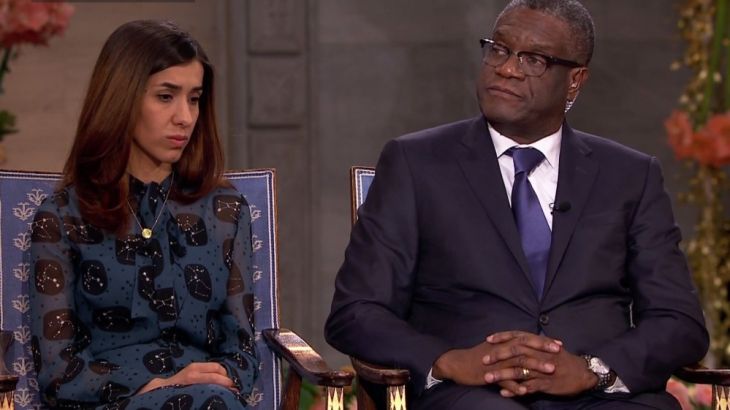
The Nobel Interview: Nadia Murad and Denis Mukwege
An exclusive interview with Nadia Murad and Denis Mukwege on the use of sexual violence as a weapon of war.
“Rape is not just a physical, violent act perpetrated against one victim, it is an assault on humanity.” – Denis Mukwege, Nobel Peace Prize laureate
It is a crime that destroys the dignity of individuals and tears apart the fabric of communities; a crime that has been carried out for generations without impunity.
Keep reading
list of 4 itemsStormy Daniels testifies during day 13 of Trump’s New York hush money trial
Key takeaways from 12th day of Trump’s New York hush-money trial
Mexicans protest and pay tribute to murdered foreign surfers
This year, sexual violence as a weapon of war has been forced into the spotlight.
On December 10, Yazidi human rights activist Nadia Murad and Congolese doctor Denis Mukwege were awarded the Nobel Peace Prize in recognition of their efforts to end sexual violence in conflict zones.
Both have worked tirelessly to defend the rights of survivors – work that has come at a deep personal cost.
”The
is a dangerous weapon.”]
Mukwege has treated thousands of sexual violence victims at Panzi hospital in the Democratic Republic of the Congo‘s war-torn east – a region where an estimated 40 women are raped every day.
“The medical treatment is only a small part in the handling of victims of sexual violence. When we started, their trauma was so strong that they could not continue a normal life, so we included psychological handling. But when they are excluded by the family, by the community, by the husband, if you leave them in the street they will be raped again. So we must support them to be re-integrated into society,” Mukwege tells Al Jazeera.
“I think sexual violence has always been denied in our society. It must not be the victim that bears the suffering of having been raped. We must be able to change this suffering of the victim and turn it towards the aggressors and the torturers,” he says.
Murad, a survivor of sexual enslavement by the Islamic State of Iraq and the Levant group (ISIL, also known as ISIS), is advocating for the rescue of 3,000 Yazidi women still in captivity and the return of 300,000 Yazidi refugees to northern Iraq.
“As we are talking here, 3,000 women and girls of Yazidi villages are still in the hands of ISIS. They are sold, they are raped and we don’t know what their situation is and what it’s going to be,” says Murad.
“I still feel shameful of what has happened to me and many other Yazidi girls. [But] after we were somewhere safe … we wanted to raise our voices … If we don’t speak up today, tomorrow this will continue.”